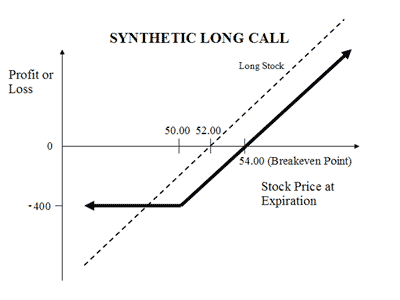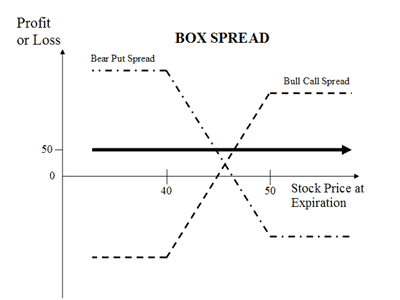 Zerodha (Trading Account)
Zerodha (Trading Account)
FREE Equity Delivery and MF
Flat ₹20/trade Intra-day/F&O
 Zerodha (Trading Account)
Zerodha (Trading Account)
FREE Equity Delivery and MF
Flat ₹20/trade Intra-day/F&O

|
|
Compare Synthetic Call and Box Spread (Arbitrage) options trading strategies. Find similarities and differences between Synthetic Call and Box Spread (Arbitrage) strategies. Find the best options trading strategy for your trading needs.
| Synthetic Call | Box Spread (Arbitrage) | |
|---|---|---|
 |
 |
|
| About Strategy | A Synthetic Call strategy is used by traders who are currently holding the underlying asset and are Bullish on it for the long term. But he is also worried about the downside risks in near future. This strategy offers unlimited reward potential with limited risk. The strategy is used by buying PUT OPTION of the underlying you are holding for long. If the price of the underlying rises then you make profits on holdings. If it falls then your loss will be limited to the premium paid for PUT OPTION. | Box Spread (also known as Long Box) is an arbitrage strategy. It involves buying a Bull Call Spread (1 ITM and I OTM Call) together with the corresponding Bear Put Spread (1 ITM and 1 OTM Put), with both spreads having the same strike prices and expiration dates. The strategy is called Box Spread as it is combination of 2 spreads (4 trades) and the profit/loss calculated together as 1 trade. Note that the total cost of the box remain same irrespective to the price movement of underlying security in any direction. The expiration value of the box spread is actually the difference between the strike prices of the options involved. The Long Box strategy is opposite to Short Box strategy. It is used when the spreads are under-priced with respe... Read More |
| Market View | Bullish | Neutral |
| Strategy Level | Beginners | Advance |
| Options Type | Call + Underlying | Call + Put |
| Number of Positions | 2 | 4 |
| Risk Profile | Limited | None |
| Reward Profile | Unlimited | Limited |
| Breakeven Point | Underlying Price + Put Premium | |
| Synthetic Call | Box Spread (Arbitrage) | |
|---|---|---|
| When to use? | A Synthetic Call option strategy is when a trader is Bullish on long term holdings but is also concerned with the associated downside risk. |
Being risks free arbitrage strategy, this strategy can earn better return than earnings in interest from fixed deposits. The earning from this strategy varies with the strike price chosen by the trader. i.e. Earning from strike price '10400, 10700' will be different from strike price combination of '9800,11000'. The long box strategy should be used when the component spreads are underpriced in relation to their expiration values. In most cases, the trader has to hold the position till expiry to gain the benefits of the price difference. Note: If the spreads are overprices, another strategy named Short Box can be used for a profit. This strategy should be used by advanced traders as the gains are minimal. The brokerage payable when implementing this strategy can take away all the profits. This strategy should only be implemented when the fees paid are lower than the expected profit. |
| Market View | Bullish |
Neutral The market view for this strategy is neutral. The movement in underlying security doesn't affect the outcome (profit/loss). This arbitrage strategy is to earn small profits irrespective of the market movements in any direction. |
| Action |
The strategy is used by buying PUT OPTION of the underlying you're holding for long. If the price of the underlying rises then you make profits on holdings. If it falls then your loss will be limited to the premium paid for PUT OPTION. |
Say for XYZ stock, the component spreads are underpriced in relation to their expiration values. The trader could execute Long Box strategy by buying 1 ITM Call and 1 ITM Put while selling 1 OTM Call and 1 OTM Put. There is no risk of loss while the profit potential would be the difference between two strike prices minus net premium. |
| Breakeven Point | Underlying Price + Put Premium |
| Synthetic Call | Box Spread (Arbitrage) | |
|---|---|---|
| Risks | Limited Maximum loss happens when price of the underlying moves above strike price of Put. Max Loss = Premium Paid |
None The Box Spread Options Strategy is a relatively risk-free strategy. There is no risk in the overall position because the losses in one spread will be neutralized by the gains in the other spread. The trades are also risk-free as they are executed on an exchange and therefore cleared and guaranteed by the exchange. The small risks of this strategy include:
|
| Rewards | Unlimited Maximum profit is realized when price of underlying moves above purchase price of underlying plus premium paid for Put Option. Profit = (Current Price of Underlying - Purchase Price of Underlying) - Premium Paid
|
Limited The reward in this strategy is the difference between the total cost of the box spread and its expiration value. Being an arbitrage strategy, the profits are very small. It's an extremely low-risk options trading strategy. |
| Maximum Profit Scenario | Underlying goes up |
|
| Maximum Loss Scenario | Underlying goes down and option exercised |
| Synthetic Call | Box Spread (Arbitrage) | |
|---|---|---|
| Advantages | Provides protection to your long term holdings. |
|
| Disadvantage | You can incur losses if underlying goes down and the option is exercised. |
|
| Simillar Strategies | Married Put |


FREE Intraday Trading (Eq, F&O)
Flat ₹20 Per Trade in F&O
|
|
I had a positive experience with ( Fla )_ ( shrec )_ ( la im ) at gm_-ail DOT C-O-M or. ( Fla )_ ( shrec )_ ( la im ) at (o u t)~(lo ok). DOT c-0-m
It’s always helpful to have reliable resources to r_ecov_er funds after being scammed